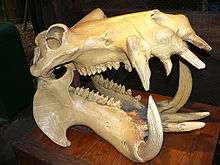skull
English

Etymology 1
From Middle English sculle, scolle (also schulle, scholle), probably from Old Norse skalli (“bald head, skull”), itself probably related to Old English sċealu (“husk”). Compare Swedish skulle, Norwegian skalle. [1]
Alternatively, perhaps from Old Norse skoltr, skolptr (“muzzle, snout”), akin to Icelandic skoltur (“jaw”), dialectal Swedish skullt, skulle (“dome, crown of the head, skull”), Middle Dutch scolle, scholle, Middle Low German scholle, schulle (“clod, sod”). Compare also Old High German sciula, skiula (“skull”).
Alternative forms
- scull (obsolete)
Pronunciation
- enPR: skŭl, sko͝ol, IPA(key): /skʌl/
Audio (US) (file) - Homophone: scull
- Rhymes: -ʌl
Noun
skull (plural skulls)
- (anatomy) The main bones of the head considered as a unit; including the cranium, facial bones, and mandible.
- 1922, Virginia Woolf, Jacob's Room Chapter 1
- He was about to roar when, lying among the black sticks and straw under the cliff, he saw a whole skull—perhaps a cow's skull, a skull, perhaps, with the teeth in it. Sobbing, but absent-mindedly, he ran farther and farther away until he held the skull in his arms.
- 1922, Virginia Woolf, Jacob's Room Chapter 1
- A symbol for death; death's-head
- (figuratively) The mind or brain.
- 2006, Bart Yates, The Brothers Bishop
- My thoughts are flying around in my skull like fireflies in a jar, but all of a sudden I'm unbearably tired and can't stay awake.
- 2006, Bart Yates, The Brothers Bishop
- A crust formed on the ladle, etc. by the partial cooling of molten metal.
- The crown of the headpiece in armour.
- (Scotland) A shallow bow-handled basket.
Meronyms
Derived terms
Translations
|
|
See also
Verb
skull (third-person singular simple present skulls, present participle skulling, simple past and past participle skulled)
- To hit in the head with a fist, a weapon, or a thrown object.
Etymology 2
See school (“a multitude”).
Noun
skull (plural skulls)
- Obsolete form of school (“a multitude”).
- 1586, William Warner, Albion’s England:
- A knavish skull of boys and girls did pelt at him.
- 1601, Philemon Holland (translator), Pliny the Elder (author), The Historie of the World. Commonly called, The Natvrall Historie of C. Plinivs Secvndvs., book IX, chapter xv: “Of the names and natures of many fishes.”:
- These fishs, togither with the old Tunies and the young, called Pelamides, enter in great flotes and skulls, into the sea Pontus, for the sweet food that they there find: and every companie of them hath their fever all leaders and captaines; and before them all, the Maquerels lead the way; which, while they be in the water, have a colour of brimstone; but without, like they be to the rest.
- 1586, William Warner, Albion’s England:
Part or all of this entry has been imported from the 1913 edition of Webster’s Dictionary, which is now free of copyright and hence in the public domain. The imported definitions may be significantly out of date, and any more recent senses may be completely missing.
(See the entry for skull in Webster’s Revised Unabridged Dictionary, G. & C. Merriam, 1913.)
Swedish
Etymology
An archaic form of skuld (debt) from Old Norse skuld, from Proto-Germanic *skuldiz, from Proto-Indo-European *(s)kéltis.
Pronunciation
- IPA(key): /skɵlː/
Noun
skull c
- (for someone's) sake, (on someone's) behalf; an archaic form of skuld (debt), used to indicate for whom or why something is done
- för din skull
- for your sake, for you, because of you, on your behalf
- För edra hjärtans hårdhets skull tillstadde Moses eder att skiljas från edra hustrur
- Moses because of the hardness of your hearts suffered you to put away your wives (Matthew 19:8)
- för din skull